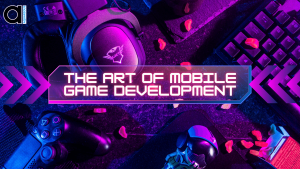The Art of Mobile Game Development

In the fast-paced world of technology, mobile games have become a significant part of our daily lives. Whether it’s a quick session during a commute or a leisurely evening pastime, mobile games provide entertainment and relaxation to millions of people worldwide. Behind every successful mobile game is the art of mobile game development which you can achieve if you hire dedicated ios developer from Aquarious Technology. This article explores the intricacies of this fascinating field, from the initial concept to the final product, highlighting the key elements and processes involved.
Introduction to Mobile Game Development
Mobile game development involves creating interactive and entertaining games specifically designed for mobile devices. This process requires a combination of technical skills, creativity, and a deep understanding of the target audience. Hire dedicated ios developer who will consider various factors, including the platform’s limitations, user experience, and monetization strategies, to deliver an engaging and successful game.
The Conceptualization Phase
Before diving into development, a solid conceptualization phase sets the foundation for a mobile game. This phase involves brainstorming ideas and defining the game’s genre, mechanics, and storyline. It’s crucial to conduct market research and identify potential competitors to ensure the game offers unique features and stands out in the crowded mobile gaming market.
Designing Engaging Gameplay
Engaging gameplay is the heart and soul of a mobile game. Hire dedicated ios developer who must create mechanics and challenges that capture the player’s attention and keep them immersed in the game world. Striking the right balance between simplicity and complexity is essential to provide a rewarding and enjoyable gaming experience.
Choosing the Right Graphics and Audio
Visuals and audio play a crucial role in enhancing the overall experience of a mobile game. The choice of graphics style, colour palette, and character design should align with the game’s theme and target audience. Similarly, selecting appropriate background music, sound effects, and voiceovers can greatly enhance immersion and player engagement.
Developing Cross-Platform Compatibility
To reach a broader audience, mobile games often need to be compatible with multiple platforms, such as iOS and Android. Developers must optimize the game for various screen sizes, resolutions, and device capabilities, ensuring a consistent and enjoyable experience across different devices.
Implementing User-Friendly Controls
Intuitive and user-friendly controls are essential for mobile games. Touchscreen gestures, swipes, taps, and tilts should be seamlessly integrated to provide a smooth and responsive gaming experience. Simplicity and ease of use are paramount to attract and retain players.
Balancing Performance and Optimization
Mobile devices have varying hardware specifications, so optimizing game performance is crucial. Developers must find the right balance between high-quality visuals, smooth gameplay, and optimal resource usage to ensure the game runs smoothly on a wide range of devices.
Incorporating In-Game Monetization Strategies
Monetization is a vital aspect of mobile game development. Developers can implement various strategies, such as in-app purchases, advertisements, and subscriptions, to generate revenue. Careful consideration should be given to striking a balance between monetization and the player’s overall experience to avoid alienating or frustrating the audience.
Testing and Quality Assurance
Thorough testing and quality assurance are imperative to deliver a bug-free and polished game. Developers should conduct extensive testing across different devices, screen sizes, and operating system versions to identify and fix any issues. Player feedback during this phase can be invaluable in improving gameplay and addressing any performance or usability concerns.
Deploying the Game to App Stores
Once the game is ready, it needs to be submitted to various app stores, such as the Apple App Store and Google Play Store. Developers must adhere to specific guidelines and requirements set by each platform to ensure a smooth submission and approval process. App store optimization techniques can also be employed to improve visibility and discoverability.
Post-Launch Support and Updates
The journey of mobile game development doesn’t end with the game’s release. Regular updates, bug fixes, and new content are essential to keep players engaged and satisfied. Monitoring player feedback and analyzing game metrics can provide insights for future updates and improvements.
The Importance of Player Feedback
Listening to player feedback is crucial for the success of a mobile game. It helps developers identify areas for improvement, understand player preferences, and adapt the game accordingly. Engaging with the community through social media, forums, and in-game events fosters a loyal player base and can lead to valuable word-of-mouth promotion.
Staying Updated with Emerging Technologies
The field of mobile game development is constantly evolving with new technologies and trends. Developers should stay updated with emerging technologies, such as augmented reality (AR), virtual reality (VR), and cloud gaming, to leverage their potential and deliver innovative gaming experiences.
Trends and Future of Mobile Game Development
The trends and future of mobile game development are exciting and promising, driven by advancements in technology and changing player preferences. Hire dedicated ios developer who are up-to-date with the key points highlighting the direction this industry is heading:
Augmented Reality (AR) and Virtual Reality (VR)
The integration of AR and VR technologies is set to revolutionize mobile gaming. With devices becoming more powerful and affordable, immersive experiences that blend the real and virtual worlds will become increasingly prevalent.
Multiplayer and Social Gaming
Mobile games are shifting towards multiplayer experiences, allowing players to compete or collaborate with friends and other gamers worldwide. Social features such as leaderboards, achievements, and in-game chat enhance engagement and foster a sense of community.
Cross-Platform Integration
Developers are focusing on creating games that can be seamlessly played across multiple platforms, such as smartphones, tablets, consoles, and PCs. Cross-platform integration enables players to enjoy their favourite games regardless of the device they are using.
Cloud Gaming
The advent of cloud gaming services allows players to stream games directly to their devices, eliminating the need for high-end hardware. This technology enables access to a vast library of games and opens new possibilities for mobile gaming.
Artificial Intelligence (AI)
AI-powered features, such as intelligent NPCs (non-player characters) and adaptive gameplay, are enhancing the gaming experience. AI algorithms can analyze player behaviour and preferences to personalize the game and provide tailored challenges.
Mobile eSports
Competitive gaming on mobile devices, known as mobile eSports, is gaining popularity. Organized tournaments, professional teams, and dedicated streaming platforms are emerging, creating opportunities for skilled players to showcase their talents and engage in a highly competitive environment.
Indie Game Development
The rise of indie game development has brought fresh and innovative ideas to the mobile gaming landscape. Independent developers are pushing boundaries, creating unique and captivating experiences that resonate with players.
Subscription Services
Subscription-based models are becoming more prevalent, offering players access to a curated collection of games for a monthly fee. These services provide a cost-effective way to discover and play a wide variety of games without individually purchasing each title.
Data-Driven Development
Developers are leveraging data analytics to gain insights into player behaviour, preferences, and engagement patterns. This data-driven approach helps in making informed decisions regarding game updates, monetization strategies, and content creation.
Emerging Technologies
As technology continues to advance, new possibilities, such as 5G connectivity, haptic feedback, and gesture recognition, will shape the future of mobile game development, providing more immersive and interactive experiences.
Conclusion
Mobile game development is a captivating blend of art, creativity, and technical expertise. From concept to deployment, the process involves careful planning, design, development, testing, and ongoing support. By understanding the needs and preferences of the target audience, embracing emerging technologies, and staying agile in a rapidly evolving landscape, developers can create immersive and memorable mobile gaming experiences.
-
14
+Category
-
98
+Post
Top Categories
Popular Posts
- The Power of Prototyping in Software Development
- Version Control Best Practices for App Development
- Understanding Visual Hierarchy: A Guide to Effective Design
- Crafting Intuitive Navigation: A Guide to Seamless User Experience
- Choose Your Best Cloud Provider
- Making the Leap: Transitioning from Manual to Automated Software Testing
- Using GitHub- Advantages and Disadvantages
- E-commerce Product Photography on a Budget
- Tech Innovation in Developing Countries
- Smart Cities: How Technology is Shaping the Urban Landscape
- Principles of Composition: Creating Visual Harmony with Composition
- Exploring Cross-Platform App Development
- Why Regular Website Updates Matter
- Navigating Effective Facebook Audience Targeting
- Implementing Ads for Game Monetization
- Designing User-Centric Mental Health Apps: Enhancing Well-being in the Digital Age
- NFTs and Collectibles: Creating NFT App Solutions for Collectors and Enthusiasts
- Successful Implementation of Enterprise Apps
- Maximizing Business Impact with EQ
- Proven SMO Ads Optimization Tips (2023)






